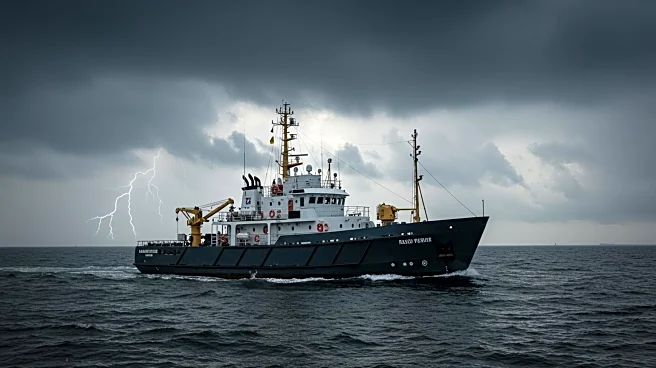What's Happening?
The International Salvage Union (ISU), representing global salvage contractors, has reported ongoing financial pressures within the marine salvage industry. Despite a recovery in gross revenues to USD $406 million in 2024, the industry remains below typical income levels from a decade ago. The ISU emphasizes the importance of financial sustainability, advocating for income from awards based on Article 13 of the Salvage Convention. This reward system compensates salvors for their risk in saving property during maritime incidents. The use of the traditional Lloyd’s Open Form contract has declined, prompting ISU to promote its new edition. Wreck removal, a significant part of salvage operations, contributes about 50% of annual income, with ongoing revisions to related contracts. The ISU also highlights its role in preventing marine pollution, having serviced vessels carrying over 2.4 million tonnes of potential pollutants in 2024.
Why It's Important?
The financial sustainability of the marine salvage industry is crucial for maintaining global trade and environmental protection. Salvors play a vital role in mitigating risks and reducing losses during maritime incidents, which can have significant economic and environmental impacts. The industry's ability to respond to new challenges, such as fires on containerships and vessels powered by alternative fuels, is essential for adapting to evolving maritime risks. The ISU's efforts to revise contracts and promote financial sustainability are key to ensuring the industry's continued contribution to environmental protection and the reputation of shipowners. The salvage industry supports Environmental, Social, and Governance (ESG) requirements, which are increasingly central to business operations.
What's Next?
The ISU plans to continue promoting the use of the Lloyd’s Open Form contract and monitor developments with its new edition. Revisions to wreck removal contracts are ongoing, with a focus on Wreckhire and Wreckfixed. The industry is expected to increase its focus on dealing with casualties involving new fuel types, such as LNG, hydrogen, and ammonia. The ISU will continue to advocate for the recognition of professional salvors and their contributions to reducing loss and preventing pollution. Stakeholders in the marine industry are likely to support these efforts, recognizing the importance of salvage operations in maintaining trade and environmental standards.
Beyond the Headlines
The marine salvage industry faces ethical and environmental challenges, particularly in preventing pollution and protecting marine ecosystems. The ISU's work in responding to incidents and removing debris highlights the industry's role in safeguarding the environment. The shift towards alternative fuels presents new risks and opportunities for salvors, requiring adaptation and specialized expertise. The industry's contribution to ESG requirements underscores its importance in broader societal and environmental contexts, influencing corporate policies and practices.










